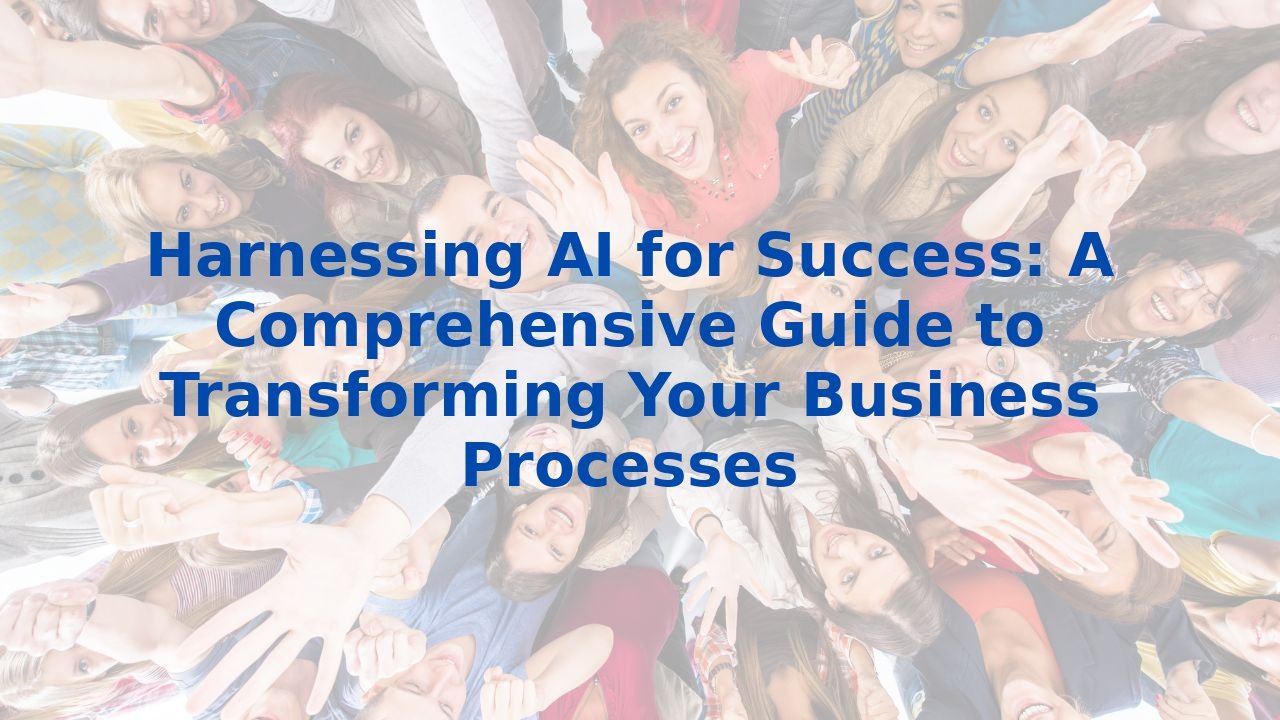Harnessing AI for Success: A Comprehensive Guide to Transforming Your Business Processes
Harnessing AI for Success: A Comprehensive Guide to Transforming Your Business Processes
In the rapidly changing landscape of modern business, the journey to success transcends mere effort and dedication. It calls for astute planning, agile operations, and an innate ability to pivot with the market's rhythm. Among the myriad tools available, Artificial Intelligence (AI) stands out as a game-changer that can redefine how businesses approach their core processes. In this guide, we will dive deep into how AI enhances various business operations, amplifying efficiency, and why training your workforce is essential to maximize these benefits.
Understanding Business Process Management
Business Process Management (BPM) serves as the backbone of any organization striving for operational excellence. BPM's goal is straightforward: to enhance the efficiency and effectiveness of business operations. Traditionally, BPM relied on manual oversight, which often led to bottlenecks and discrepancies. However, integrating AI into BPM has prompted a revolutionary transformation—one that empowers companies to refine processes with unprecedented precision.
How AI Enhances Business Processes
1. Process Discovery and Mapping
AI employs sophisticated techniques, such as process mining and natural language processing, to unveil existing processes within an organization. This technology creates comprehensive process maps, ensuring every step is recorded and current. By analyzing real-time data, AI diminishes the burden of manual tracking, allowing teams to operate with agility.
2. Process Automation
The power of AI lies in its ability to automate mundane tasks. Whether it's data entry or document management, AI efficiently handles repetitive activities, liberating employees to focus on high-impact projects. This shift not only enhances productivity but also mitigates the risk of errors often associated with manual intervention.
3. Real-Time Monitoring and Predictive Analytics
AI offers real-time process monitoring, enabling organizations to spot potential issues before they escalate. By harnessing historical data, AI can foresee outcomes and identify anomalies, allowing companies to proactively address obstacles. This real-time insight is not just a luxury; it’s a vital advantage that can save time and resources.
4. Decision Support and Optimization
In a landscape teeming with data, the ability to make informed decisions is paramount. AI assists by processing vast amounts of structured and unstructured data, extracting valuable insights that enhance decision-making. With the capability to simulate various scenarios, AI empowers organizations to evaluate outcomes swiftly and optimize their strategies effectively.
5. Continuous Improvement
AI fosters an environment of continuous improvement. It supplies ongoing feedback and data-driven recommendations, enabling businesses to adapt and refine processes dynamically. This iterative approach not only unveils opportunities for innovation but also ensures that BPM remains agile, aligning with evolving business landscapes.
Benefits of AI for Improving Efficiency
The integration of AI into business practices yields a plethora of advantages, including:
- Enhanced Productivity: Automating repetitive tasks raises the overall productivity by allowing employees to concentrate on more strategic, high-value functions.
- Improved Decision-Making: AI delivers actionable insights through predictive analytics, facilitating well-informed, data-backed decisions.
- Reduced Errors: By automating tasks and providing real-time monitoring, AI substantially diminishes the risk of human error.
- Cost Savings: AI optimizes processes, driving down operational costs while maximizing effectiveness.
- Enhanced Customer Experience: AI personalizes customer interactions, enriching service levels and responsiveness.
The Importance of Training Employees for AI
While AI is a transformative tool, its true potential can only be harnessed when employees are properly equipped to engage with it. Consider the following reasons underlining the necessity of AI training:
- Understanding AI Capabilities: Employees need a foundational understanding of AI to integrate it meaningfully into their roles.
- Data Interpretation: Training enables staff to make sense of the data AI generates, fostering informed decision-making.
- Process Optimization: Employees who understand AI can leverage its insights to enhance efficiency within their processes.
- Adaptability: As AI evolves, so too must the skills of the workforce; training fosters an adaptable mindset.
Conclusion
In closing, the amalgamation of AI within business processes signals an era of unprecedented efficiency and innovation. Through its capabilities in process discovery, automation, real-time monitoring, and decision support, AI emerges as a pivotal ally in streamlining operations and enriching customer experiences. However, the journey does not end here; empowering employees through training is crucial. This ensures that every member of the organization can fully engage with AI technologies, thus unlocking their potential and securing a competitive edge. Embrace this evolution, and propel your business into a future defined by success and transformative growth.



